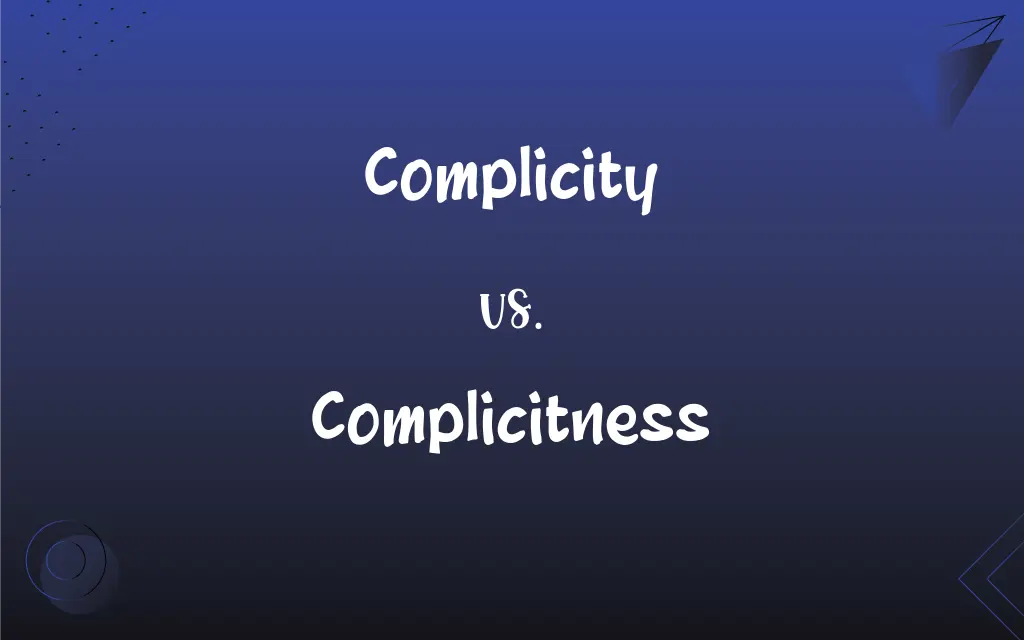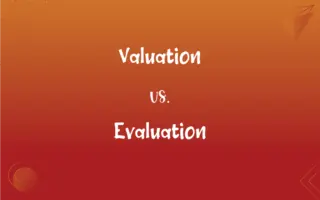Complicity vs. Complicitness: What's the Difference?
Edited by Janet White || By Harlon Moss || Updated on November 10, 2023
Complicity refers to involvement in wrongdoing; the state of being an accomplice. Complicitness refers to the quality or state of being complicit.

Key Differences
Complicity refers to the act of being involved with others in an illegal activity or wrongdoing. It implies a direct participation or partnership in the action. Complicitness, on the other hand, defines the quality or state of being complicit. It's more about the characteristic or condition of being an accomplice rather than the act itself.
When considering complicity, it often suggests active or passive involvement in a negative act. This term is frequently used in legal contexts. Complicitness, however, is a less common term and focuses more on the attribute of being complicit. It's about the tendency or propensity to be involved in complicity.
In usage, complicity is widely recognized and used in both legal and general language. It is specific and direct. Complicitness is less commonly used and is more abstract, referring to the nature or quality of being complicit, rather than a specific act.
Complicity is a noun that can be directly attributed to a person or group, indicating their involvement in a misdeed. For example, one might be charged with complicity in a crime. Complicitness, while also a noun, is used to describe the characteristic of being complicit, often in a more theoretical or abstract manner.
The difference in connotation between complicity and complicitness is subtle but significant. While complicity is more about the act or involvement, complicitness is about the state or characteristic of being willing to be complicit, potentially even without direct action.
ADVERTISEMENT
Comparison Chart
Definition
Involvement in wrongdoing
Quality or state of being complicit
Usage Frequency
Commonly used
Less commonly used
Context
Legal and general
More abstract or theoretical
Directness
Direct involvement
Abstract quality or propensity
Connotation
Specific act or participation
Tendency or inclination towards complicity
ADVERTISEMENT
Complicity and Complicitness Definitions
Complicity
The state of being an accomplice.
She was charged with complicity in the crime.
Complicitness
The state of being involved with others in an unlawful or unethical act.
His complicitness was a topic of much debate.
Complicity
Involvement as a partner in a questionable act or a crime.
His silence was taken as complicity.
Complicitness
The quality of being an accomplice in wrongdoing.
The investigation revealed his complicitness.
Complicity
The act of helping to commit a crime or do wrong.
Their complicity in the escape plan was critical.
Complicitness
Inclination towards partnership in wrongdoing.
The jury considered his complicitness in their verdict.
Complicity
Association or participation in or as if in a wrongful act.
There was evidence of his complicity in the fraud.
Complicitness
The characteristic of being willingly involved in unethical actions.
Her complicitness in the scheme was unexpected.
Complicity
Participation in a wrongful act.
His complicity in the scandal was evident.
Complicitness
A tendency to be complicit in illegal activities.
His history suggested a degree of complicitness.
Complicity
Involvement as an accomplice in a questionable act or a crime.
Complicitness
The quality of being complicit.
Complicity
The state of being complicit; involvement as a partner or accomplice, especially in a crime or other wrongdoing.
Complicity
(archaic) Complexity.
Complicity
The state of being an accomplice; participation in guilt.
Complicity
Guilt as an accomplice in a crime or offense
FAQs
How is complicitness different from complicity?
Complicitness refers to the quality or state of being complicit, while complicity is the act itself.
What is complicity?
Involvement in wrongdoing or being an accomplice.
Does complicity imply direct involvement?
Yes, it often suggests direct participation in a wrongful act.
Can complicitness exist without action?
Yes, it can imply a tendency or inclination towards being complicit, even without direct action.
Can someone be charged with complicitness?
Typically, charges are framed in terms of complicity, not complicitness.
Is complicitness a common term?
No, it's less commonly used and more abstract than complicity.
Are there different levels of complicity?
Yes, one can be complicit directly or indirectly in varying degrees.
Is it possible to prove complicitness?
Proving complicitness can be challenging as it's more about a characteristic than a specific act.
How is complicity used in everyday language?
It's used to describe someone's involvement in a negative action or decision.
Can organizations be complicit?
Yes, organizations can be complicit if they aid or abet in wrongful acts.
Does complicity require intention?
Yes, complicity usually involves intentional participation in wrongdoing.
Can complicity be used in legal contexts?
Yes, complicity is often used in legal contexts to describe involvement in a crime.
What is an example of complicitness?
Showing a consistent tendency to ignore unethical practices.
Can complicity be passive?
Yes, passive complicity involves not acting against a wrongful act.
How do courts determine complicity?
Courts consider evidence of direct or indirect involvement in a crime.
Can someone be morally complicit?
Yes, moral complicity refers to involvement in actions considered unethical.
Is complicity always illegal?
While often associated with illegal acts, complicity can refer to involvement in any wrongful act.
Can ignorance be considered complicity?
In some cases, willful ignorance can be seen as a form of complicity.
What is a synonym for complicity?
Accomplice, involvement, or participation.
Is complicitness a legal term?
It's less commonly used in legal contexts compared to complicity.
About Author
Written by
Harlon MossHarlon is a seasoned quality moderator and accomplished content writer for Difference Wiki. An alumnus of the prestigious University of California, he earned his degree in Computer Science. Leveraging his academic background, Harlon brings a meticulous and informed perspective to his work, ensuring content accuracy and excellence.
Edited by
Janet WhiteJanet White has been an esteemed writer and blogger for Difference Wiki. Holding a Master's degree in Science and Medical Journalism from the prestigious Boston University, she has consistently demonstrated her expertise and passion for her field. When she's not immersed in her work, Janet relishes her time exercising, delving into a good book, and cherishing moments with friends and family.
































































